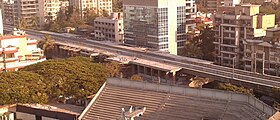Line 1 (Mumbai Metro)
Reliance Infrastructure holds 69% of the equity share capital of MMOPL, 26% is with Mumbai Metropolitan Region Development Authority (MMRDA),[2] and the remaining 5% stake with Veolia Transport.
[8] The Government of Maharashtra through the MMRDA, in order to improve the traffic and transportation scenario in Mumbai and to cater to the future travel needs in the next 2-3 decades began exploring the viability of various alternative mass transit systems which are efficient, economically viable and environment friendly.
[13] The concession agreement for the Versova–Andheri–Ghatkopar corridor was signed with Mumbai Metro One Pvt Ltd (MMOPL), a joint venture company owned by Reliance Infrastructure (69%), Veolia Transport (5%) and the MMRDA (26%), in March 2007.
[26] However, land acquisition and right-of-way issues, along with problems with the construction of a Metro-related viaduct, delayed the line's predicted completion to summer 2012.
[26][27] In May 2012, the Indian Bank restructured the Mumbai Metro's ₹1.08 billion (US$12 million) loan account, citing the project's land use problems.
[30][31] However, MMRDA officials told Business Standard in August 2013 that the metro would be delayed further as it had not received approval from the Central Railway Safety Commissioner, and some of the facilities remained incomplete.
[57] The CMRS also said that he would travel to Lucknow to discuss the inspection with RDSO officials and then cross check all the other necessary approvals, including rolling stocks, from the Railway Board.
[73] On 5 September 2012, a slab collapsed at the under-construction Subhash Nagar metro station in Andheri, killing one construction worker and injuring 16 people.
Chavan's appearance at the inauguration came despite the fact that he had threatened to boycott the ceremony the previous day to protest RInfra's decision to raise fares.
[12] The authority also announced that children under the age of 12 years and/or up to four feet tall, and accompanied by their parents, could travel for free on opening weekend.
Line 1 had transported 1 million passengers by 4:30 p.m. on 11 June or within 59 operating hours; reaching the milestone quicker than any other Indian metro system.
[91][92] Mumbai Metro One announced that Line 1 had transported more than 150 million passengers since operations began, crossing the milestone on 26 January 2016, India's 67th Republic Day.
Google Maps also displayed facilities like stairs, escalators, and ticket counters, helping commuters plan their journeys more efficiently.
An MMRDA official told Business Standard, "There is no question of any fare hike right now, as the issue will be considered after the service is started by MMOPL.
"[101] MMOPL completed the refinancing of project borrowings, achieving substantial benefits through extension of maturity and reduction of interest costs in June 2015.
Prior to this notification, Line 1 was under the Indian Tramways Act, 1886, and the Chief Minister had the sole power to decide fare revisions.
"[111] Anil Galgali, an RTI activist and chairman of the Mumbai-based NGO Athak Seva Sangh, wrote a letter to the Chief Minister on 2 May 2014, urging him to use his special powers to prevent the fare hike.
[45] Coaches are also fitted with LED displays showing dynamic route map, and LCD TVs for entertainment, information and advertising.
The agency invested ₹30 crore (US$3.5 million) to introduce a Radio Frequency Identification (RFID) chip based system to accomplish the task.
The MMOPL said that the RFID system provides even longer lifespan for wheels, and the agency states that it will recover the ₹ 30 crore investment within 2 years through savings on maintenance costs.
In early 2017, MMOPL completed the installation of light-emitting diode (LED) lighting at all metro stations, the depot, and administrative buildings to reduce electricity consumption.
The MMOPL also began a project under the Renewable Energy Service Company (RESCO) model to install rooftop solar panels at all stations and the metro depot.
Under the model, a private company will bear the cost of setting and operating the panels, and will sell the generated power to the MMOPL at a rate of ₹ 5.1 per unit.
[147] On 1 October 2012, Xylem, a water technology provider based in the United States, announced that it had been awarded a contract to develop wastewater treatment and recycling systems for the Mumbai Metro.
The plant will be equipped with Xylem's Sanitaire wastewater treatment technology, which is expected to help save up to 1.2 million litres of water a day.
The contract for the Versova–Andheri–Ghatkopar corridor was awarded to the Mumbai Metro One Pvt Ltd (MMOPL), a joint venture company owned by Reliance Infrastructure, Veolia Transport and the MMRDA, in March 2007.
The service is provided by Paytm and a QR code is generated on the commuter's phone which is read at entry and exit by a scanner at the turnstiles.
[161] In January 2020, MMOPL started issuing paper tickets with a QR code printed on it with an aim to completely move from the earlier plastic RFID-based tokens.
The Commissioner of Metro Railway Safety (CMRS) granted approval to operate at speeds up to 80 km/h (50 mph), and RDSO gave its clearance on 18 November 2015.
Senior security personnel will take a call if these persons can be punished or penalised under the Central Metro Act, or should be handed over to the local police for necessary action.









